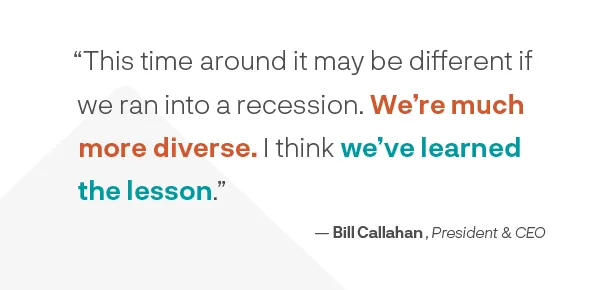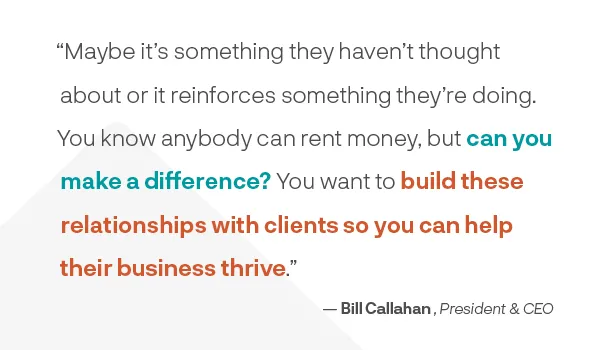Work with banking partners you can count on to help you achieve growth goals
It’s still sunny economically in the greater Phoenix area and William (Bill) Callahan, President & CEO of Arizona Bank & Trust, a division of HTLF Bank, expects it to continue into 2024.
“It doesn’t feel like business has dropped off dramatically,” he said. He’s seen profit margins decline, but customers have created strategies to deal with changing economic realities.
Commercial and industrial customers make up about 75 percent of the bank’s portfolio. Clients are building something, selling products or in service-related businesses. Their banking needs include financing, inventory and accounts receivable and access to general working capital.
MARKET ADVANTAGES
Arizona’s economic health comes from creating diversity since the last recession. The Phoenix area has moved from its real-estate centric economy of 20 years ago to more technology, manufacturing and service-related industries.
“There was a conscious effort to diversify the economy away from real estate,” said Callahan, a 40year banking veteran.
Contributing to the effort is Taiwan Semiconductor, one of the world’s largest chip manufacturers, who is building a plant in north Phoenix.
Also boosting the local economy is more people moving into Arizona than moving out — about 100,000 annually. Most of those are from 18-to-44-years old in their prime working and family-raising times, he said. Heading into winter the greater Phoenix area has a population of 5.5 million people.

“That’s a huge positive impact here. This time around it may be different if we ran into a recession. We’re much more diverse. I think we’ve learned the lesson,” he said.
States like Arizona, Florida, Nevada and parts of California, where the housing market bubble burst in the Great Recession of 2007-09, were real estate dependent for many years. While real estate is still a large piece of the economic pie, it’s less speculative than in the past, he said.
Education is a big niche. Callahan said his bank counts one of the country’s largest charter schools, Great Hearts Academies, now in four states, as a client.
“We were an early pioneer in financing the charter school movement.”
The bank has more than 10 charter school associations in their book of business, Callahan said.
Our bank also has a number of higher education clients, including Ottawa University. This growing university is based out of Kansas but has its largest campus in Phoenix.
Consumer debt has declined from almost 100 percent of disposable income to a smaller proportion. “So the consumer is not overburdened with debt today,” Callahan said. “That’s a positive for me.”
Another advantage is housing values have not fallen, even though increasing interest rates have made upgrading or buying a new home challenging. Many have a mortgage interest rate of 3 percent versus a 7 or 7.5 percent rate if they refinanced or acquired a new mortgage.
“So even though we’re not seeing as many homes sell, there is no supply so that keeps values up. That’s providing a wealth feeling for people whether they tap into it or not. It makes them more confident and that’s an interesting dynamic.”
Callahan is also optimistic about lower unemployment that stayed steady in 2023.
MARKET CHALLENGES
Inflation is a challenge in Phoenix as elsewhere.
"We’re a couple years into pressures around higher inflation. You know, supply chain, people costs and all those kinds of things going on,” he said.
“So no perceivable slow down, but everyone still has the people issue — finding adequate staff to do the things that companies need them to do,” he said.
Passing along costs so far hasn’t been a problem. But Callahan acknowledged the longer inflation continues, the harder it will be to manage.
“To me all the positive economic factors say the market feels like the Fed may be done raising rates into 2024. We might actually see the Fed have to take action to reduce rates and once that happens, I think the economy across the country is going to blossom.”
WHAT YOU CAN DO
Understanding the business clients that the bank serves and how peers in the industry are succeeding has helped clients manage costs.
For example, a retailer client had capital invested in an eight-to-nine month product inventory which was hurting its cost structure.
The bank advised them about peer practices, with other similar stores keeping about half that amount of inventory on hand and reducing their expenses.
Companies go out of business because they run out of cash.
By understanding liquidity management in times like these, the company was able to reduce their inventory and maintain a healthier cash flow.
“Just tweaking numbers like that, you could see how much less they would have to borrow. And how much more they would have in their checking account,” he said.
Our bankers are trained to listen to their clients and offer solutions by providing valuable information, making a difference in their bottom line. Offering research on top-performing peer-businesses across the country helps clients make better decisions.

“Maybe it’s something they haven’t thought about or it reinforces something they’re doing. You know anybody can rent money, but can you make a difference? You want to build these relationships with clients so you can help their business thrive,” he said.
HOW WE CAN HELP
Tools, like the bank’s Commercial Card, are important to help manage cash flow, because it allows businesses to use the time from purchase to paying off the card to manage their money more strategically.
“The card picks up float for you. You have 30–45 day window before you have to make a cash outlay,” he said. “We all know how to manage our cards. Whatever you put on it, you pay off every month. You don’t carry a balance. It’s a payment tool.”
The bank also helps customers mitigate fraud with various products, especially Positive Pay.
Check fraud tops the list in the Phoenix area at about 75 percent of overall fraud, he said.
Positive Pay allows customers to review account numbers, check amounts and payee names before the bank pays the check. But Callahan says commercial cards are still safer if customers carefully monitor charges and report fraud within the required window of time.
Larger companies use virtual or ghost cards that change account numbers with every transaction. “We build in a lot of safety measures to help our clients and we’re here to support them.”
Get Your Financial Feed Today
The Financial Feed is the premiere publication for banking insights. Each issue prioritizes strategies on how business leaders can continue to grow despite possible economic headwinds. We hope these findings help you conquer potential challenges and capitalize on opportunities.

